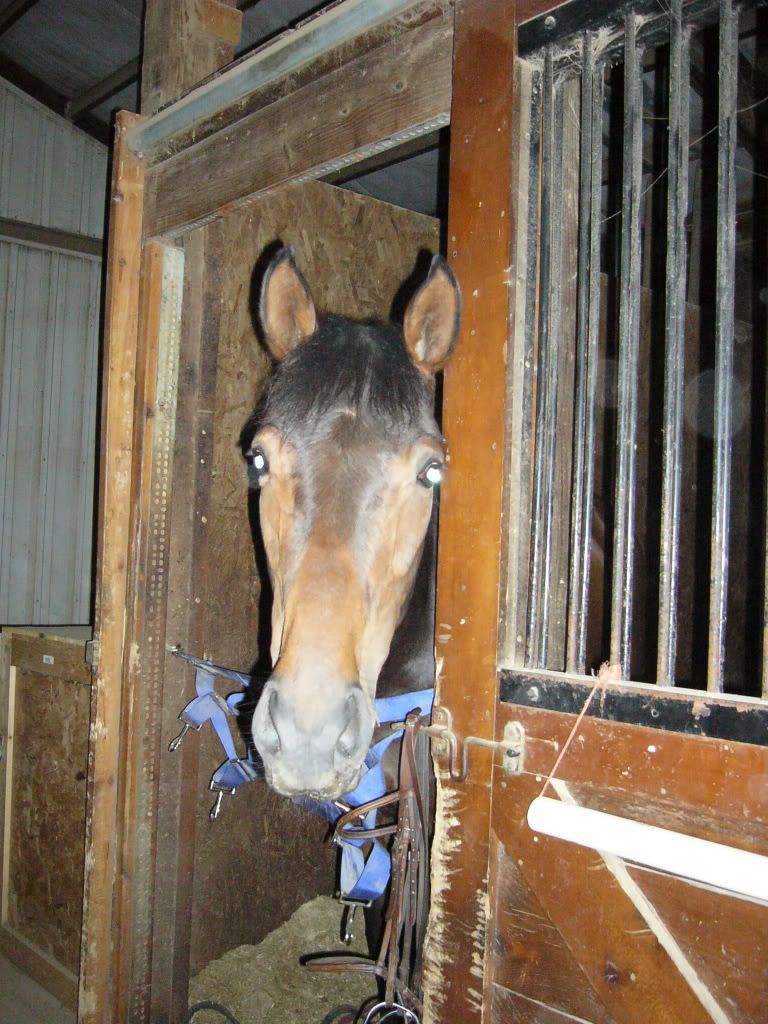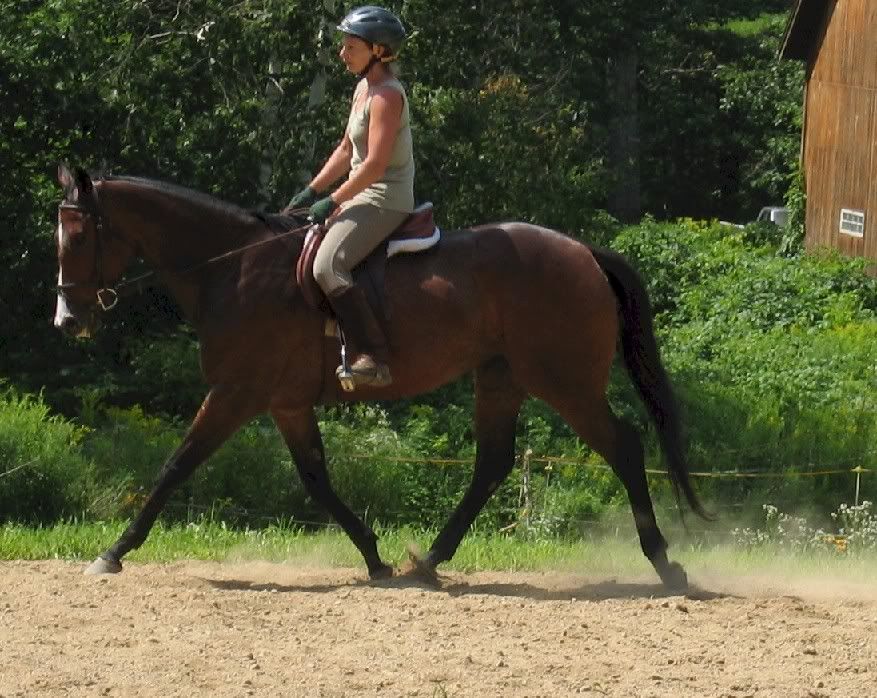|
|
Post by sariditty on Feb 28, 2008 15:13:41 GMT -5
**If WEIGHT LOSS is the goal, when doing aerobic (a.k.a. cardio) AND weight training together, do the weights first and then the aerobic (treadmill/elliptical/bike/etc.). This is because in the first part of exercise, your body is burning off glycogen (what you get from carbs). The more glycogen your body burns, then the more protein your body will use as fuel for the workout. The percentage of energy contributed by fat goes up considerably after an hour of exercise. And since strength training uses mostly glucose for energy, doing that workout first will also increase the amount of fat your body uses for the cardio workout. Therefore....abracadabra!....you're burning more fat this way! ;D **WATER!!! I'll preach about this to anyone for probably as long as I live! hahaha Everyday the average person loses the equivalent of 8 glasses holding 8-oz. of water (=64oz.) through normal sweat, breathing, urination and bowel movements. So it makes sense when you hear the old saying, "Drink 8 eight-ounce glasses of H2O each day" because you're simply replacing the water you naturally expel. Without enough water, your body will retain the toxins that water is intended to flush out AND it becomes too acidic and goes into a preservation and fat-storing mode. Now for the part you've probably not heard!!.......IF you exercise (and not just light exercise), you ought to drink 1 Liter of water for every 30 pounds of body weight on you. So I weigh 150-ish....I (try to) drink 5L of water each day. Yes, it's a lot of water! So squeeze in some lime juice or add cucumbers or cut up fruit for an added kick. And I usually start off each meal with a huge glass of water to help with the feeling of fullness. So....yeah.....1 Liter H2O per each 30lbs. body weight.  (And also, dry air - whether it's arid or cold - will drain your body's hydration...so keep that in mind.) |
|
|
|
Post by coyote on Feb 29, 2008 11:14:18 GMT -5
Excellent information.. again!
|
|
|
|
Post by FlipFlop on Feb 29, 2008 11:33:47 GMT -5
**If WEIGHT LOSS is the goal, when doing aerobic (a.k.a. cardio) AND weight training together, do the weights first and then the aerobic (treadmill/elliptical/bike/etc.). This is because in the first part of exercise, your body is burning off glycogen (what you get from carbs). The more glycogen your body burns, then the more protein your body will use as fuel for the workout. Ok this doesn't make sense to me because I've heard that it doesn't matter. The only advantage to doing cardio first is warming up your muscles. Either way, once you deplete your blood glucose you will swap to glycogen stores, then once those are used up you will utilize body fat. So why would it matter? As long as you did the same amt of exercise in either order (say 30 mins lifting first then 45 mins cardio and vice versa), then once you use up your carb stores, you will burn fat. |
|
|
|
Post by sariditty on Feb 29, 2008 16:20:50 GMT -5
**If WEIGHT LOSS is the goal, when doing aerobic (a.k.a. cardio) AND weight training together, do the weights first and then the aerobic (treadmill/elliptical/bike/etc.). This is because in the first part of exercise, your body is burning off glycogen (what you get from carbs). The more glycogen your body burns, then the more protein your body will use as fuel for the workout. Ok this doesn't make sense to me because I've heard that it doesn't matter. The only advantage to doing cardio first is warming up your muscles. Either way, once you deplete your blood glucose you will swap to glycogen stores, then once those are used up you will utilize body fat. So why would it matter? As long as you did the same amt of exercise in either order (say 30 mins lifting first then 45 mins cardio and vice versa), then once you use up your carb stores, you will burn fat. IF you have to do both strength training and cardio on the same day & at the same time, you'll get the best fat loss if you do weights and then cardio because....if you're mainly trying to lose fat and maintain the muscle mass (not build) you have to consider the way our bodies are made. Around an hour or so of exercising, our bodies are designed to get our energy to burn calories from fat. Weight-training basically pulls our glucose stores for energy (think of it this way...you don't need gobs of energy to do 10 reps with a 12-lb. dumbbell.). Following a session of weight-training (anywhere from 30 to 60 minutes for most people), your body will be near or at that 1-hour mark of being ready to use your stored-up body fat for its energy to workout. You will undoubtably burn more calories during a cardio workout than a weights workout. Which is a good reason to do the cardio second: you're buring fat . Our bodies will burn glucose first and then fat. Simple as that. Ideally it is best to keep the 2 types of workouts separate (different days or by about 5 to 6 hours) so that each workout is given a full amount of energy and attention. As for warming up muscles before weight-lifting...I recommend and practice personally about 5 minutes of cardio (jumping jacks, walking on treadmill, elliptical, you-name-it) to get them warm and ready to work. haha I feel like I'm speaking in tongues now!! Too much on my mind today and now glucose vs. protein vs. fat! LOL Sometimes it's so much easier to explain things verbally as opposed to typing b/c my mind goes a lot quicker than my fingers. Sorry, all! And...I am not a fitness god (self-proclaimed or otherwise) by any means  ...these are all strictly my opinions and accountabilities as a Certified Personal Trainer. I know even with my other CPT friends that we have differing opinions on a few subjects. |
|
|
|
Post by coyote on Feb 29, 2008 19:38:37 GMT -5
What I know is that if doing both, I do normally do the weights first. There are several reasons for me (risk of dropping free weights on my head is one:)). What I also know is that if I start to do the cardio first, I'll hear your voice (or your typing) and do the weights first. It's easy enough to do that. I've been around fitness for a long time, and you do know what you're talking about:). Now, if you ever figure out why the formula of calories consumed and calories used doesn't work, then you will be *the* fitness guru of all time LOL. It isn't as simple as people often think and that seemingly simple formula has many unknown variables.
Have either of you heard that if you do your exercises, say run three miles, that you should wait several hours before you eat or you body will simply take the nutrition for the newly eaten food. In other words, it inhibits the loss of fat? I don't remember where I picked up that tidbit. I don't know whether it's true or not but it sounds plausible, and I tend to follow it.
It's all interesting really.
|
|
|
|
Post by FlipFlop on Mar 2, 2008 12:37:20 GMT -5
Sariditty-I understand what you are trying to say, but I guess Im thinking of it a different way. No matter what activity you do, you body uses blood glucose first, then muscle glycogen stores, then when these are used up, you switch to burning body fat stores. So regardless of what you do first, you will go through this process. So if you do cardio first, you will probally use a most of your glycogen stores, if not all, if you sustain exercise for a period of time. So if you did weights after, as long as you haven't restored muscle glycogen levels by eating and then waiting for a bit, you would still be using fat stores because that is all your body has left for energy. Youre right in that you will always use blood glucose first, and these levels are constantly restored because the brain can only use glucose as an energy source, so the body must maintain blood levels. But the order in which you exercise does not matter aside from perhaps increasing risk of injury because of fatigue when done back to back.
And as far as using protein for fuel, on a cellular level, it is much less energeticly favorable to break down protein to make ATP. So this actually doesn't happen until absolutely necessary. It actually can make you really sick because of the by products (ketones) produced from protein breakdown. So your body will actually mobilize all body fat before ever using body protien stores (muscle).
I'm not try to argue with you, so I'm sorry if it comes across as that. I've just studied physiology and metabolism for a long time and read tons of peer reviewed studies on exercise phys, metabolism and energy balance regulation.
|
|
|
|
Post by sariditty on Mar 2, 2008 12:44:30 GMT -5
Not a prob at all, flipflop!!!!  I think it's great that more than one of us is knowledgeable in this field!! |
|
|
|
Post by sarafina on Mar 11, 2008 11:41:39 GMT -5
ok, so maybe this is a stupid question, but what is that ammonia smell when i finish running? (i'm not in hugely great shape, and run 3-4 times per week for about 2-3 miles) i thought it was that i had used up my readily available glycogen stores and that the body was working to make energy from another source. is that true?
|
|
|
|
Post by FlipFlop on Mar 11, 2008 12:59:47 GMT -5
ok, so maybe this is a stupid question, but what is that ammonia smell when i finish running? (i'm not in hugely great shape, and run 3-4 times per week for about 2-3 miles) i thought it was that i had used up my readily available glycogen stores and that the body was working to make energy from another source. is that true? Sweat and normal body bacteria? Your body would kick to using fat before it ever used muscle (unless you had no body fat) and ammonia smell would come from nitrogen (from protein). But chances are you if you are running 2-3 miles, you aren't depleating glycogen sources. Moderate exercise like that isn't really enough to deplete stores. |
|
|
|
Post by niaru on Mar 11, 2008 16:39:49 GMT -5
But chances are you if you are running 2-3 miles, you aren't depleating glycogen sources. Moderate exercise like that isn't really enough to deplete stores.   that sounds like a lot of exercise to me! ok, I need to up my exercise regimen a bit, I guess...lol Even when exercising a lot, I could never drink that much water (1 L per 30 lbs body weight). Ever. I think I would get sick if I did. |
|






 ...these are all strictly my opinions and accountabilities as a Certified Personal Trainer. I know even with my other CPT friends that we have differing opinions on a few subjects.
...these are all strictly my opinions and accountabilities as a Certified Personal Trainer. I know even with my other CPT friends that we have differing opinions on a few subjects.  I think it's great that more than one of us is knowledgeable in this field!!
I think it's great that more than one of us is knowledgeable in this field!! 


 that sounds like a lot of exercise to me!
that sounds like a lot of exercise to me!